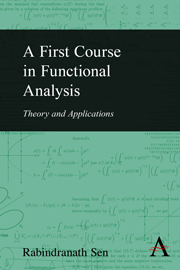Book contents
- Frontmatter
- Preface
- Contents
- Introduction
- I Preliminaries
- II Normed Linear Spaces
- III Hilbert Space
- IV Linear Operators
- V Linear Functionals
- VI Space of Bounded Linear Functionals
- VII Closed Graph Theorem and Its Consequences
- VIII Compact Operators on Normed Linear Spaces
- IX Elements of Spectral Theory of Self-Adjoint Operators in Hilbert Spaces
- X Measure and Integration in Lp Spaces
- XI Unbounded Linear Operators
- XII The Hahn-Banach Theorem and Optimization Problems
- XIII Variational Problems
- XIV The Wavelet Analysis
- XV Dynamical Systems
- List of Symbols
- Bibliography
- Index
- Frontmatter
- Preface
- Contents
- Introduction
- I Preliminaries
- II Normed Linear Spaces
- III Hilbert Space
- IV Linear Operators
- V Linear Functionals
- VI Space of Bounded Linear Functionals
- VII Closed Graph Theorem and Its Consequences
- VIII Compact Operators on Normed Linear Spaces
- IX Elements of Spectral Theory of Self-Adjoint Operators in Hilbert Spaces
- X Measure and Integration in Lp Spaces
- XI Unbounded Linear Operators
- XII The Hahn-Banach Theorem and Optimization Problems
- XIII Variational Problems
- XIV The Wavelet Analysis
- XV Dynamical Systems
- List of Symbols
- Bibliography
- Index
Summary
A Hilbert space is a Banach space endowed with a dot product or scalar product. A normed linear space has a norm, or the concept of distance, but does not admit the concept of the angle between two elements or two vectors. But an inner product space admits both the concepts such as the concept of distance or norm and the concept of orthogonality–in other words, the angle between two vectors. Just as a complete normed linear space is called a Banach space, a complete inner product space is called a Hilbert space. An inner product space is a generalisation of the n-dimensional Euclidean space to infinite dimensions.
The whole theory was initiated by the work of D. Hilbert (1912) [24] on integral equations. The currently used geometrical notation and terminology is analogous to that of Euclidean geometry and was coined by E. Schmidt (1908) [50]. These spaces have up to now been the most useful spaces in practical applications of functional analysis.
Information
- Type
- Chapter
- Information
- A First Course in Functional AnalysisTheory and Applications, pp. 91 - 129Publisher: Anthem PressPrint publication year: 2013
